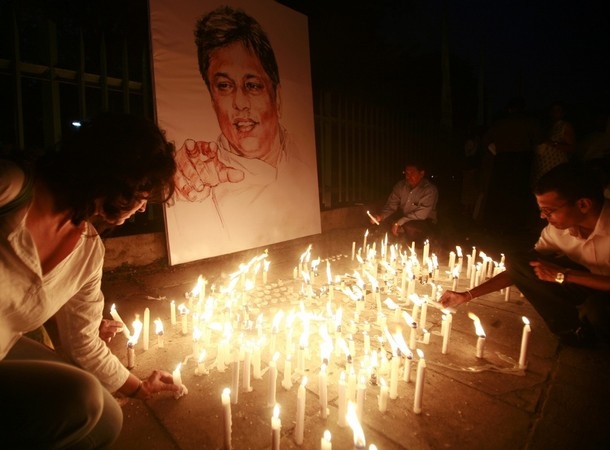The body of slain newspaper editor and International Press Institute (IPI) World Press Freedom Hero Lasantha Wickrematunge was exhumed yesterday at Colombo’s general cemetery in the presence of a magistrate and under tight security as part of a fresh investigation into his death.
Wickrematunge’s grave had been under armed guard since a new autopsy was announced in early September. The editor of the Sunday Leader newspaper, Wickrematunge was shot by unidentified gunmen riding on motorcycles as he drove in his car to work outside the Sri Lankan capital Colombo on the morning of Jan. 8, 2009.
One of the most persistent and authoritative critics of both the government of then-president Mahinda Rajapaksa and the separatist Tamil Tigers, Wickrematunge grimly had foreseen his own death in an editorial published three days after his murder, in which he wrote: “When finally I am killed, it will be the government that kills me.”
Wickrematunge also predicted that an investigation into his murder would languish.
“In the wake of my death I know you [President Rajapaksa] will make all the usual sanctimonious noises and call upon the police to hold a swift and thorough inquiry,” he wrote. “But like all the inquiries you have ordered in the past, nothing will come of this one, too.”
Wickrematunge’s prediction proved accurate, as investigations into his death remained at a standstill until Maithripala Sirisena was elected president in a surprise victory over the incumbent Rajapaksa in the 2015 presidential election.
President Sirisena vowed to tackle some of Sri Lanka’s most trenchant press freedom issues, including impunity, as part of the new government’s 100-day programme and he promised to reopen investigations into Wickrematunge’s death.
In March 2016, he appointed a special committee to examine instances of harassment or violence against journalists under Rajapaksa’s rule. In July, an army intelligence officer was arrested in connection with Wickrematunge’s murder and remains in custody.
On Sept. 8, on the request of the Crime Investigation Department (CID), a judge ordered that Wickrematunge’s body be exhumed after scrutiny of two separate medical examinations showed different results. According to news reports, one autopsy report said Wickrematunge had died of gunshot wounds, while the other said stab wounds were the cause of death.
IPI Director of Advocacy and Communications Steven M. Ellis expressed hope that the decision to exhume Wickrematunge’s body represented a renewed impetus and commitment by authorities to finally bring to justice those responsible for the journalist’s murder some seven years after his death.
“At the same time, we urge the current government, which took office amid a general sense of optimism, to investigate all other attacks on journalists and to make good on its promise to institute widespread media reforms,” he added.
Wickrematunge co-founded the Sunday Leader with his brother Lal Wickrematunge, now chairman of Leader Publications Ltd, which includes the Sunday Leader, in 1994. Under Lasantha Wickrematunge’s editorship, the newspaper was highly critical of Rajapaksa and his government and accused the army of human rights abuses against the ethnic minority Tamils during the country’s civil war.
As a result, the paper and its journalists were subject to threats, censorship orders, criminal defamation lawsuits, armed raids and arson attacks. Wickrematunge himself was twice badly beaten. He received anonymous death threats and his home was sprayed with machine gun fire.
In 2010, IPI posthumously named Wickrematunge a World Press Freedom Hero.
“The murder of Wickrematunge was a shocking reminder of the dangers facing Sri Lanka’s courageous journalists, for whom death is all too often the ultimate form of censorship,” IPI’s then-director, David Dadge, said at the time. “By naming him an IPI World Press Freedom Hero, IPI honours his memory and his sacrifice, and sends the strongest message possible to the Sri Lankan government that the international community will not forget his murder and that the perpetrators must be found and punished.”
IPI World Press Freedom Heroes are individuals who have made a significant contribution to the defence and promotion of press freedom, especially if that involved acts of resistance or bravery under harsh conditions.
